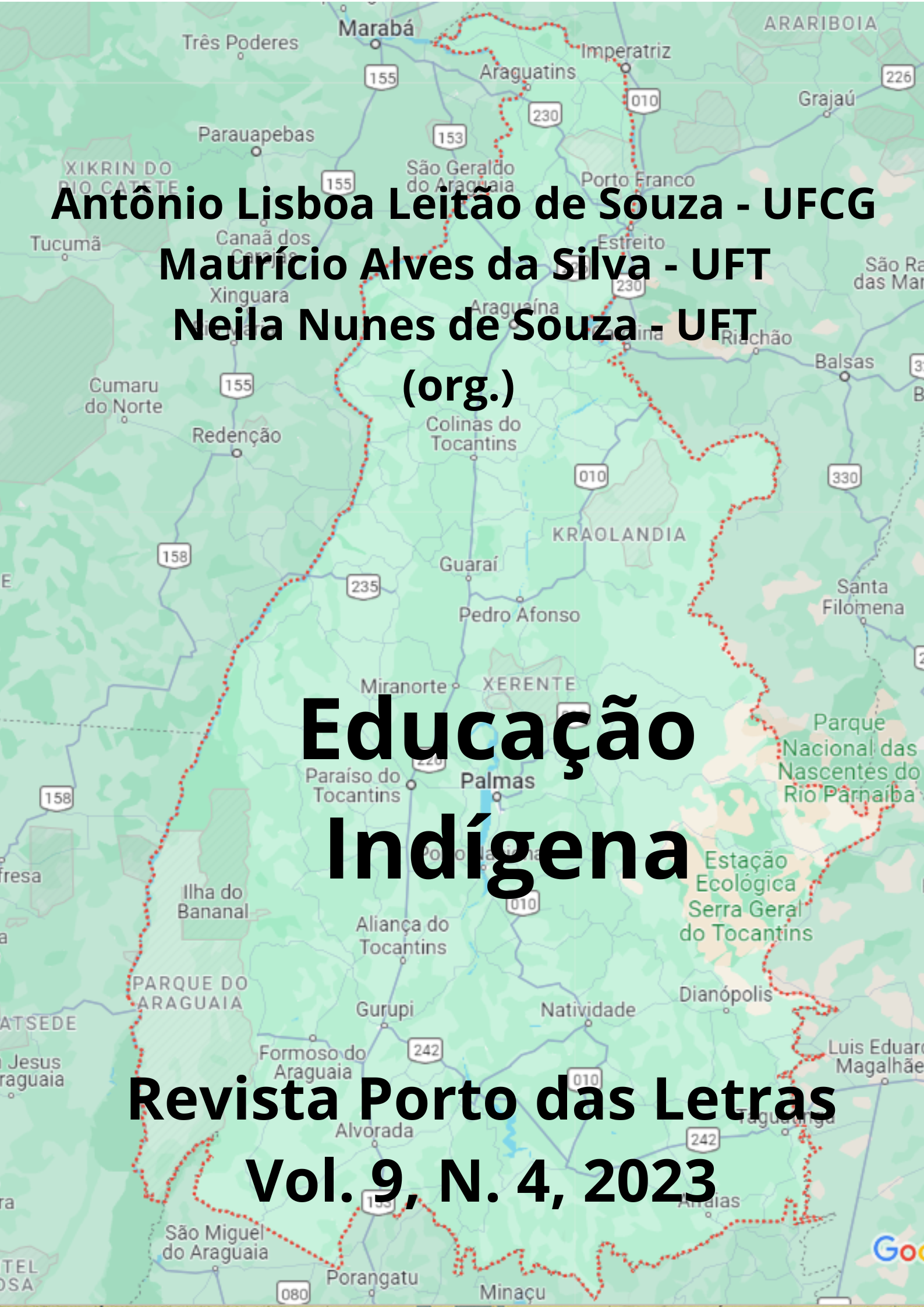PROTAGONISMO INDÍGENA
REFLEXÕES SOBRE AS POLÍTICAS LINGUÍSTICAS INSTITUCIONAIS EM EVENTO DA ABRALIN AO VIVO NO YOUTUBE, NO PERÍODO DE PANDEMIA
Resumo
Este estudo aborda sobre o protagonismo indígena e como as políticas institucionais da Associação Brasileira de Linguística (Abralin) contribuem para suscitar e afirmar as culturas, as línguas e a identidade dos povos indígenas, ou seja, as ações desenvolvidas pela Abralin que dialogam e vão ao encontro às questões linguísticas dos povos indígenas. Dessa forma, tem-se como objetivo analisar o protagonismo indígena como política de visibilidade linguística com base em três eventos do projeto Abralin ao vivo. Para esta análise, utilizou-se uma abordagem qualitativa com base nos dados disponíveis no Youtube, tendo assim como corpus as mesas-redondas - Línguas Indígenas: revitalização e retomada; Watatakalu Yawalapiti: Resistência indígena; e Políticas Linguísticas: Políticas Públicas e a Questão Indígena - que integram o projeto da Abralin ao vivo, caracterizando assim, como um estudo de natureza empírica, através da análise e discussão das pautas indígenas trazidas pelos(as) pesquisadores(as) indígenas e gestores/ativistas atuantes nos assuntos linguístico-políticos dos povos indígenas no Brasil. Sendo que o espaço online utilizado para a obtenção do corpus desta pesquisa é o canal do YouTube, da instituição supracitada. Portanto, nota-se a importância do protagonismo indígena nas instituições que dialogam a respeito da diversidade linguística, identidade e cultura desses povos. E, assim, ampliar a participação do indígena no âmbito das instituições é um caminho possível, que dará visibilidade às questões indígenas.
Referências
ASSOCIAÇÃO BRASILEIRA DE LINGUÍSTICA (ABRALIN). Estatuto. Campinas – SP. [1969]. Disponível em: https://www.abralin.org/site/estatuto/. Acesso em: 09 mai. 2021.
______. Línguas Indígenas: revitalização e retomada. Youtube, 17 mai. 2020. vídeo (112 min). Disponível em: https://www.youtube.com/watch?v=SKZ-auc7noQ&t=4691s. Acesso em: 06 abr. 2021.
______. Watatakalu Yawalapiti - Resistência indígena. Youtube, 17 jul. 2020(a). vídeo (91 mim). Disponível em: https://www.youtube.com/watch?v=ylGeSleCvsY. Acesso em: 09 mai. 2021.
______. Políticas Linguísticas: Políticas Públicas e a Questão Indígena. Youtube, 23 mar. 2021. vídeo (149 mim). Disponível em: https://www.youtube.com/watch?v=ESzG3T8mnh0. Acesso em: 06 abr. 2021.
BICALHO, Poliene S. d. S. 2010. Protagonismo indígena no Brasil: movimento, cidadania e direitos 1970-2009. Tese de doutorado, UnB.
BRASIL. Constituição (1988). Constituição da República Federativa do Brasil. Brasília, DF: Senado Federal: Centro Gráfico, 1988.
CALVET, Louis-Jean. Sociolinguística: uma introdução crítica. São Paulo: Parábola, 2002.
CALVET, Louis-Jean. Linguistique et colonialisme - petit traité de glottophagie. Paris: Payot, 1978.
ARAÚJO, Jardeane Reis de; RIBEIRO, Floriete Assunção; SILVA, Wellington Jhonner D. Barbosa da. Direitos linguísticos, políticas linguísticas e justiça social no Brasil em tempos de pandemia: Línguas indígenas, africanas e a Libras. Brazilian Journal of Development. Curitiba, v. 7, n. 6, p. 58444-58460, jun. 2021. DOI: 10.34117/bjdv7n6-306. Disponível em: https://brazilianjournals.com/index.php/BRJD/article/view/31310/pdf. Acesso em: 15 de janeiro de 2021.
SMITH, Linda Tuhiwai. Descolonizando Metodologias: Pesquisa e Povos Indígenas, Curitiba: UFPR, 2018.
MAKONI, Sinfree; PENNYCOOK, Alastair. (orgs.). Disinventing and Reconstituting Languages. Clevedon: Multilingual Matters, 2007.
MAHER, Terezinha de Jesus Machado. Políticas linguísticas e políticas de identidade: currículo e representações de professores indígenas na Amazônia Ocidental Brasileira. Currículo sem fronteiras, v. 10, n. 1, p. 33-48, 2010. Disponível em: https://biblat.unam.mx/hevila/CurriculosemFronteiras/2010/vol10/no1/3.pdf. Acesso em: 22 de mai. 2021.
ORGANIZAÇÃO DAS NAÇÕES UNIDAS (ONU). ONU celebra Ano Internacional das Línguas Indígenas pela primeira vez. Cultura e educação, 2019. Disponível em: https://news.un.org/pt/story/2019/01/1656932. Acesso em: 22 de mai. 2021.
ORGANIZAÇÃO DAS NAÇÕES UNIDAS PARA A EDUCAÇÃO, A CIÊNCIA E A CULTURA (UNESCO). Investir na diversidade cultural e no diálogo intercultural: relatório mundial da UNESCO. Paris, FR. 2009. Disponível em: https://unesdoc.unesco.org/ark:/48223/pf0000184755_por. Acesso em: 05 de dez. 2020.
ORGANIZAÇÃO INTERNACIONAL DO TRABALHO (OIT). Los derechos de los pueblos indígenas y tribales en la práctica: una guía sobre el convenio núm. 169 de la OIT. Programa para promover el Convenio núm. 169 de la OIT (PRO 169). Departamento de Normas Internacionales del Trabajo, 2009.
SEVERO, Cristine Gorski. Das línguas indígenas: por um olhar decolonial em políticas linguísticas. Revista Digital de Políticas Lingüísticas (RDPL), n. 11, p. 143-158, 2019. Disponível em: https://revistas.unc.edu.ar/index.php/RDPL/article/view/26740. Acesso em: 30 abr. 2021.
SEVERO, Cristine Gorski; ABREU, Ricardo Nascimento; MAKONI, Sinfree. Apresentação. Revista da ABRALIN, v. 17, n. 2, 2 jul. 2019. Disponível em: https://revista.abralin.org/index.php/abralin/article/view/1334/1270. Acesso em: 09 mai. 2021.
ZAVALA, Virginia. Ideologías lingüísticas, autoridad y experticia en una comunidad de práctica: a propósito de una política lingüística a favor del quechua. In: ZIMMERMANN, Klaus. Prácticas y políticas lingüísticas. Nuevas variedades, normas, actitudes y perspectivas. Madrid: Iberoamericana Editorial Vervuert, 2014. p. 129-163.
Downloads
Publicado
Como Citar
Edição
Seção
Licença
Os autores concordam com os termos da Declaração de Direito Autoral, que se aplicará a esta submissão caso seja publicada nesta revista (comentários ao editor podem ser incluídos a seguir).

